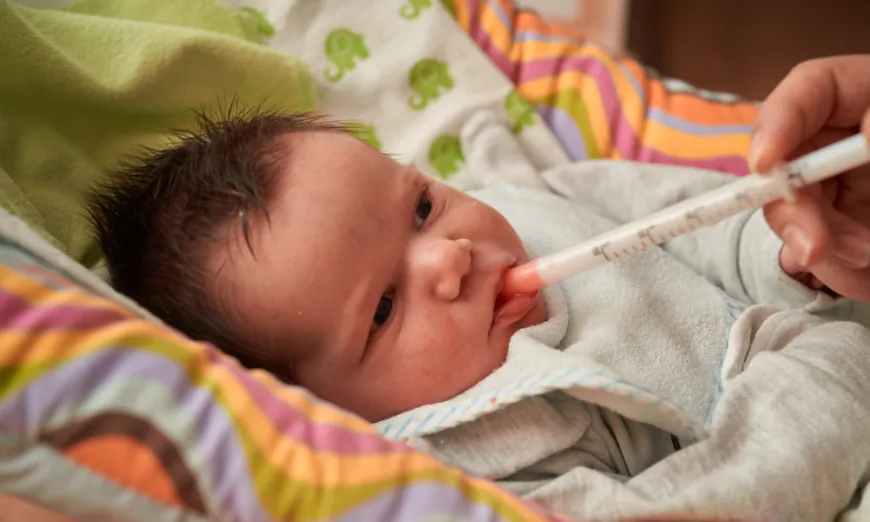
A newborn baby receives oral antibiotics, one of many contributing
factors to alterations in the gut microbiome that modulates immunity.
(Shutterstock)
https://www.theepochtimes.com/health/is-the-goliath-in-autism-research-about-to-fall-5427600
Autism is increasing at rapid rates, and researchers may be looking in the wrong places for the answer as to why.
An extensive meta-analysis of 25 autism studies could shift the focus of research into the cause of autism from genetics to environmental triggers. That shift could open up new, revolutionary avenues for potential treatments.
The research ties the disorder to changes in the gut microbiome, a community of microbes that live in the colon and are responsible for creating metabolites and other compounds crucial to our health and wellness.
Many influences outside of the human body are killing these beneficial microbes, which aren’t genetically part of us but live in symbiosis with humans. The new study, published June 26 in Nature Neuroscience, has linked autism spectrum disorders (ASD) to a distinct microbial signature that’s dysbiotic, or unnaturally out of balance. As in an ecosystem, too much of certain problematic species can destroy the overall ecology or lead to problematic consequences, such as too many of certain metabolites and not enough of others.
Meanwhile, autism rates are increasing at a speed that defies improved screening and diagnostic practices, as well as genetic patterns. The Centers for Disease Control released statistics in April that show the latest autism rate was 1 in 36 children in 2020, up from 1 in 44 in 2018, and 1 in 150 in 2000.
Taken together, the evidence suggests that it’s time to direct resources to pinpointing exactly what it is in our environment that appears to “turn on” autism development, according to doctors who are treating patients with ASD.
“Genetic diseases aren’t responsible for epidemics,” Dr. Arthur Krigsman, a specialist who treats children with ASD around the world, told The Epoch Times. “There’s something in the environment that’s triggering a gene that otherwise would be silent. There is no gene responsible for an epidemic.”
Our genes are wound up tightly in DNA spirals—many of them never being used—similar to blueprints that never make their way to the manufacturer. But cues in our environment can trigger epigenetic processes that trigger some genes to get turned on or others to get turned off, dramatically changing our likelihood of developing certain diseases or attributes.
The new research suggests that autism is linked to epigenetic triggers, which are influenced by the microbiome and modifiable over the course of our lifetime.
Researchers will undoubtedly keep trying to tease out some of the genetic links to the neurological disorder, which is largely diagnosed in childhood. Autism has been connected to more than 100 genes so far. But the puzzle has gotten more complex with environmental associations that seem to keep growing. And the heterogeneity of ASD makes it impossible to accuse one single factor as the cause.
The Epigenetic Nature of Autism
Many doctors believe that autism arises when “toxic” environmental pressures are applied and trigger epigenetic changes, Dr. Mark Cannon, a professor at Northwestern University, told The Epoch Times.
Toxicities can be biological and chemical but also emotional and social, and they can interfere with physiology. Examples include air pollutants, artificial food ingredients, glyphosate, medications, viruses, and even stress, which causes a biochemical cascade of changes in the body. All exert influence by changing the microbiome.
This community of trillions of bacteria, viruses, and fungi is responsible for breaking down food into metabolites, especially short-chain fatty acids (SCFAs) that communicate vital information to the whole body to perform digestive, neurological, and other functions. The main roles of these gut bugs are metabolism, nutrient absorption, and immune function.
Microbiomes are constantly in flux, and it’s becoming impossible to define exactly what a healthy microbiome looks like because our industrial world has already altered our microbiome in severe ways. We’re only learning how to study them in detail now. That said, patterns are emerging, and studies are offering powerful clues about how diseases are linked to certain microbiome patterns.
Dr. Cannon pointed to an autism study published in 2012 in Microbial Ecology in Health and Disease that showed the epigenetic nature of autism. Rats were given SCFAs from a subject with autism.
The rats displayed abnormal motor movements, repetitive behavior, cognitive deficits, impaired social interactions, and other traits common in autism. The brain tissue of treated rats also showed neurochemical changes—such as innate neuroinflammation, increased oxidative stress, and glutathione depletion—consistent in patients with ASD.
“Conceptually, it is the author’s opinion that the pathophysiology of ASDs may be more completely understood as being similar to conditions such as ethanol intoxication, or diabetes, and the resultant complex interactions between diet, genetics, metabolism, host microbiome, and behavior, that are well known to exist in these treatable disorders throughout the life cycle,” Dr. Derrick F. MacFabe, the study’s author, wrote.
He suggested that SCFAs are the trigger of ASD or ASD behavior. SCFAs are derived from the fermentation of nondigestible polysaccharides, such as resistant starches and dietary fibers. Among their physiological functions, SCFAs are important to intestinal epithelial cell growth, which protects the gut barrier, and to inflammation regulation.
“Yes, you can turn autism on,” Dr. Cannon said. “I can’t tell you how many times I’ve sat at a conference and heard, ‘I always thought that was genetic,’ when in fact the data has never supported that.”
Disempowerment of Genetics
Focusing too much on genetics as the cause of disease can be a detriment to important avenues of research and treatment, and can discourage families with autistic children. Wholeheartedly embracing genetics leaves them powerless, Dr. Armen Nikogosian told The Epoch Times.
In that case, for people with autism and their families, the only option is to manage the symptoms with pharmaceuticals, he said.
Dr. Nikogosian shifted his entire medical practice in 2010 after one of his sons was diagnosed with autism.
“That’s the message I got. That’s the message a lot of parents get,” he said. “They’re entrenched in this idea that there’s this genetic cause involved in this.”
Dr. Nikogosian’s goal is to help parents who want to address the root causes of the disorder with a more holistic model of care that doesn’t rely on drug management of symptoms.
He said that the development of other treatments has stagnated because of the broad denial that environmental factors are involved.
“There’s absolutely, positively, no question there’s a massive input from environmental exposures,” Dr. Nikogosian said.
Some exposures that he explores with patients are heavy metal and mold exposures, multiple infections, and vaccines. Clarifying, quantifying, and understanding the contributions of environmental exposures are important, as it opens doors to novel treatments.
Some Environmental Influences Are Known
Autism researcher James Adams said that many hypothesized risk factors continue to be validated by research. In a recent study that he conducted on a small cohort of children with autism, he discovered that common themes were prevalent throughout research.
“It turns out mothers of kids with autism consumed lower fiber, less fiber than moms of typical kids. That’s important because fiber is a very important food for some gut bacteria,” he said. “You inherit most of your microbiome from your mother.”
A 2021 study in Frontiers in Immunology found that there’s an uptick of SCFA production in pregnant women associated with fetal immune system development. The study connected breastfed babies with more diverse and robust microbiome development.
Mr. Adams said that his research and other studies have shown formula-fed babies and those with increased use of oral antibiotics are more likely to be diagnosed with autism. Early delivery is also a risk factor for autism; the Frontiers article noted that premature birth tends to impact microbiome development. Babies delivered vaginally also have more diverse microbes and lower rates of illness than those born via cesarean section.
Other common, pregnancy-related factors for ASD include maternal obesity, maternal diabetes, and complications associated with trauma, ischemia, and hypoxia, according to data reported in Neuron in 2018.
A study recently published in Psychological and Cognitive Sciences that included 450 mother-child pairs noted that at age 2, children whose moms had experienced adversity as children had altered microbiomes. Other issues that moms can experience that appear to impact their babies’ microbiomes are antibiotic use and infections.
The pathway between the microbiome and autism has gained several validating findings, making it difficult to deny as a causal factor. In a perfect world, physicians say, it should lead to major changes in clinical settings.
“You always want to know the cause, because if you know the cause, you can stop the disease,” Dr. Krigsman said. “Stop looking for a gene that probably doesn’t exist and won’t be found. Try to find the cause, and then remedy that, remove that.”
Why Cause Matters
Microbiologist Kiran Krishna told The Epoch Times that what appears to be coming is similar to the global realization that smoking was causing cancer.
The tobacco industry eventually couldn’t stop the number of small, cumulative studies that clearly documented the link. Mr. Krishna said that the same thing is happening regarding the connection between the microbiome and autism, and the new meta-analysis is important because it can help other researchers attract grants and funding to look more intentionally at microbes and their environmental influences.
“Before this, we had smoke indicating the microbiome was involved in autism, and now we have fire,” Rob Knight, the director of the Center for Microbiome Innovation at the University of California–San Diego and a study co-author, said in a statement.
There’s still a debate about whether the disease is driving dysbiosis, or the other way around. A 2021 study published in Cell concluded that dietary preferences, or restrictive eating that’s common among children with autism, is what causes changes in the microbiome. “We caution against claims that the microbiome has a driving role in ASD,” the researchers wrote.
Mr. Krishna suspects that the longitudinal data from the new study will help settle any lingering doubts as to whether the microbiome is a driver of ASD.
“We’re getting there because there are so many researchers globally that are interested in the microbiome,” he said. “We’re hitting that wave. There are somewhere around 10,000 published papers per year on the microbiome. That’s a tsunami. This paper … really puts a stamp that this is where we need to look.”
Keeping Genetics in Perspective
Jamie Morton, a corresponding author of the Nature study, told The Epoch Times that while there’s great data on how the environment shapes the microbiome, genetics will always be valuable because they determine how we’re influenced by toxic exposures.
He said that the study illustrates a cultural shift driving the marriage of researchers who tend to “camp out” in their own disciplines and are now uniting for the greater good of finding the cause of autism.
“That was one of the key points in our paper,” Mr. Morton said. “We wanted to highlight that when we are thinking about autism and these complex systems, you need everyone sitting in the same room. You need not just one dataset. You need all of them. You need genetics. You need microbiome. You need diet. You need metabolites, behavioral data, everything you can get your hands on.”



No comments:
Post a Comment